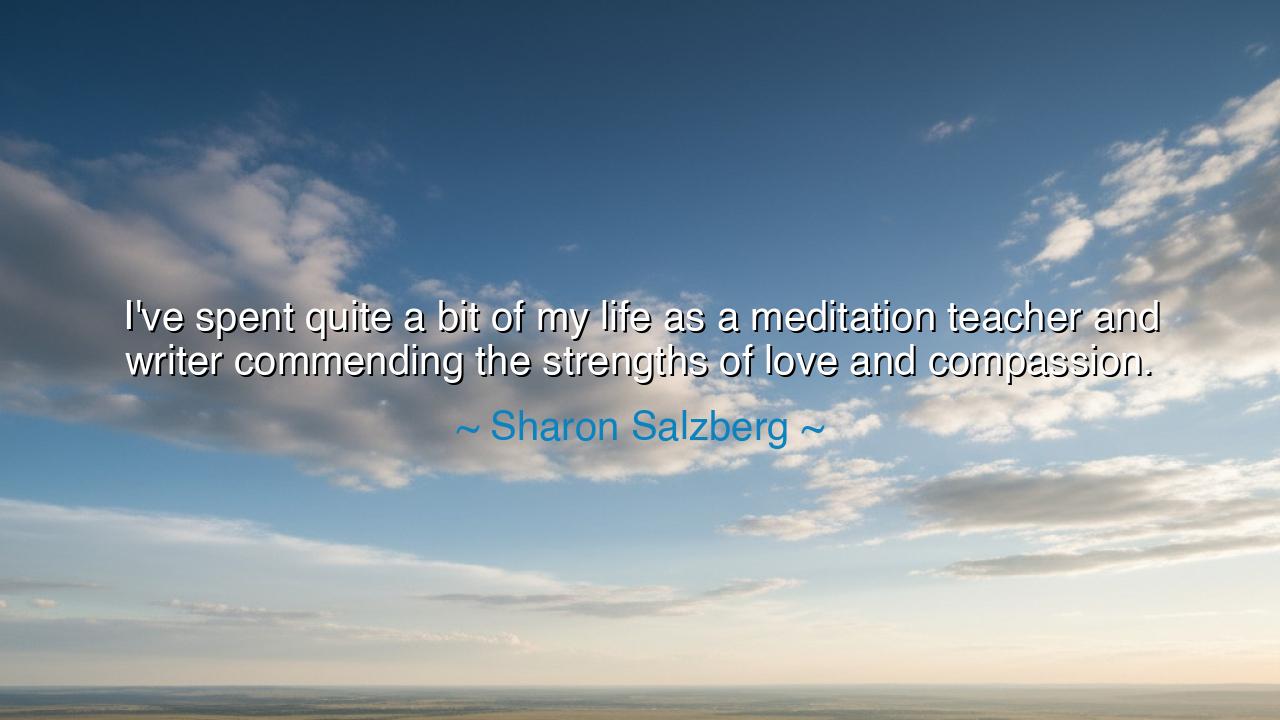
I've spent quite a bit of my life as a meditation teacher and
I've spent quite a bit of my life as a meditation teacher and writer commending the strengths of love and compassion.






When Sharon Salzberg said, “I’ve spent quite a bit of my life as a meditation teacher and writer commending the strengths of love and compassion,” she spoke as one who has walked long upon the inward path and returned with treasures for the world. Her words remind us that love and compassion are not fragile sentiments, but enduring strengths—pillars that hold the human spirit upright when all else falters. She confesses not merely a career but a lifelong devotion: to teach, to write, to remind countless souls that true power lies not in conquest, nor in wealth, but in the quiet radiance of the heart.
The origin of this quote lies in Salzberg’s journey through the teachings of Buddhism, where meditation is not escape but transformation. As a teacher, she has guided students into stillness, not so they may flee the world, but so they may return to it armed with the most profound weapons: kindness, patience, and empathy. When she says she has “commended” these strengths, she reveals her role as a herald, lifting up compassion not as luxury, but as necessity. For she knows what the ancients knew—that the health of a people depends not upon their armies, but upon the condition of their hearts.
Consider the story of Ashoka the Great, emperor of India. Once he was a conqueror, ruthless and unyielding, spilling rivers of blood. But after beholding the suffering he caused, his heart was shattered. He turned to the teachings of compassion and became a protector of life, building hospitals, planting trees, spreading the Dharma across nations. Ashoka’s transformation shows the truth Salzberg proclaims: compassion is strength, strong enough to turn even the hand of an emperor away from violence and toward peace.
Salzberg’s wisdom also carries the weight of correction for our times. Too often, modern society praises aggression as strength, greed as ambition, and domination as victory. Yet these leave behind broken lives and hollow souls. By contrast, love and compassion build bridges, heal wounds, and endure beyond the rise and fall of empires. They are not signs of weakness, but signs of a courage that refuses to harden in the face of suffering. The warrior who forgives is stronger than the one who strikes, and the leader who listens is greater than the one who silences.
The meaning, then, is clear: the strengths of love and compassion are the only strengths that enrich both giver and receiver. When you act with love, you do not diminish yourself—you expand. When you show compassion, you do not lose power—you share in a power that multiplies. Salzberg’s life as a teacher is a living testimony to this truth: her work has not conquered lands, but it has conquered despair; it has not slain enemies, but it has healed countless hearts.
The lesson for us is this: if we wish to cultivate true strength, we must cultivate compassion. Do not imagine that tenderness is weakness. Remember that the hardest stone can be worn away by the gentlest water, given time. Practice daily acts of kindness, both great and small: offer patience when anger arises, offer generosity when fear tempts you to withhold, offer presence when others feel unseen. By these simple acts, you join in the same legacy that Salzberg has devoted her life to teaching.
Practically, begin by training your heart in small meditations: breathe deeply, recall someone you love, and silently wish them well. Extend that same wish to strangers, even to those who trouble you. Let compassion become your discipline, as strength is the soldier’s discipline. In this way, you forge a resilience that no cruelty can break.
Thus, Sharon Salzberg’s words endure as guidance: to commend love and compassion is to commend the greatest strengths of all. Let us carry this teaching as a torch, lighting the path not only for ourselves but for generations yet to come. For though empires may fall and monuments may crumble, the power of compassion remains eternal, shaping the destiny of humankind.






AAdministratorAdministrator
Welcome, honored guests. Please leave a comment, we will respond soon